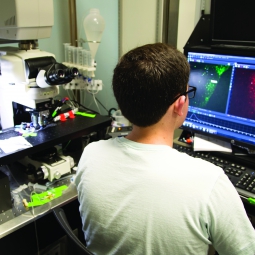Objective 4: Enhance the Complementary and Integrative Health Research Workforce

Researchers from many different biomedical and behavioral disciplines are the key holders of scientific knowledge and technologies required for in-depth investigation of the basic biological, physiological, and clinical effects and safety of complementary health approaches and their integration with conventional medicine. Over the years, NCCIH has also targeted resources aimed at attracting well-trained and experienced scientists into complementary and integrative health research and in supporting their development as scientific leaders in the field.
NCCIH continues its commitment to training researchers with the expertise needed to conduct successful basic, translational, and clinical studies on complementary health approaches. For example, NCCIH supports a variety of training and career development awards that provide funding for new and early-stage investigators as well as mid-career investigators. Recently, a special Working Group of the National Advisory Council on Complementary and Integrative Health examined the topic of the complementary and integrative health research workforce. Their report, which focuses specifically on ways to expand and strengthen the clinician-scientist workforce, was presented and discussed at the February 5, 2016 Council meeting. The report is available at nccih.nih.gov/sites/nccam. nih.gov/files/Workforce-Development-Working-Group-Report.pdf.
STRATEGIES
1. Support research training and career development opportunities to increase the number and quality of scientists trained to conduct rigorous, cutting-edge research on complementary and integrative health practices.
NCCIH supports a range of research training and career development programs aimed at increasing the number, quality, and diversity of well-prepared, skilled investigators with knowledge and expertise in both complementary and integrative health and state-of-the art research methods. Because complementary and integrative health approaches include a wide variety of modalities and specializations, NCCIH’s training strategies must include innovative approaches that incorporate an understanding of this diversity to ensure that future workforce needs for the universe of modalities and the various combinations of these modalities are met.
In particular, the Center will focus on:
- Clinician-scientists, including conventionally trained physicians, complementary health practitioners, and other health care professionals (e.g., clinical psychologists, nurses) who conduct research across a wide range of complementary and integrative heath approaches.
- Scientists trained in key biomedical and behavioral research disciplines necessary for rigorous, state-of-the-art scientific investigation of complementary and integrative health interventions, practices, and disciplines.
- Individuals from groups who are underrepresented in scientific research (e.g., racial and ethnic minority populations) and are interested in careers in complementary and integrative health research.
2. Foster interdisciplinary collaborations and partnerships.
Across the fields of biomedical and behavioral research it has become clear that clinical investigation aimed at providing scientific evidence useful to the public, health care providers, and health policymakers is an inherently interdisciplinary enterprise that often requires a team of researchers with different areas of expertise. This is particularly true of the field of complementary and integrative health research. Rigorous investigation in this field requires cross-disciplinary and multidisciplinary teams, both within and across institutions and health care settings.
For example, NCCIH is currently working with a number of other NIH Institutes and Centers, the Department of Veterans Affairs, and the Department of Defense on designing studies of complementary and integrative approaches for the management of pain in military and Veteran populations. These studies will require multidisciplinary teams of scientists working in either military or Veterans’ health care systems.